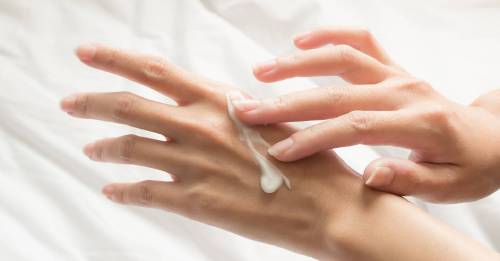To help determine whether you have eczema, plus the causes and treatment, we quizzed Nurse Alice Jenkins, Dermatologist at Harley Injectables on everything there is to know about the red, rashy, skin ailment.
What is eczema and what does it look like?
There are a few types of eczema, including severe eczema, atopic dermatitis and atopic eczema. All of which are “a chronic inflammatory autoimmune disease, where the skin barrier can be defective, leading to loss of function which means allergens can sensitise through the skin”, says Nurse Alice.
“It is characterised by itchy, non-contagious, inflamed skin that can be present on any part of the body. The appearance of eczema can vary from mild forms, when skin looks dry and flaky, to severe forms, when skin can be extremely irritated and red. The most severe forms of eczema can make your skin crack and ooze.”
So many skin conditions can come under the description of ‘rash’; Rosacea, hives, psoriasis, and of course, eczema.
The term ‘eczema’ refers mostly to atopic dermatitis, the most common form of the skin condition. It’s more prevalent in children and infants but can still occur as an adult.

What causes eczema?
The exact cause of eczema is unknown, but “it’s thought to be linked to an overactive response by the body’s immune system to an irritant. And it’s this response that causes the symptoms of eczema.”
“In addition, eczema is commonly found in families with a history of other allergies or asthma. While it’s not contagious, eczema is often inherited and infants with parents who have allergies or asthma are at highest risk for development.”
Is there a cure for eczema?
Unfortunately, there is no miracle cure for eczema.
“Treatment for the condition aims to heal the affected skin and prevent flare-ups of symptoms. Doctors will suggest a plan of treatment based on an individual’s age, symptoms, and current state of health.”
Eczema usually starts in babies or young children and often, symptoms improve when a child becomes a grown-up. “For some people, eczema goes away over time. For others, it remains a lifelong condition.”
Are there certain triggers that can make eczema worse?
There are certain things that can aggravate eczema, causing flares.
“Everyone’s triggers are different – they can include dry skin, irritants, rough fabrics such as wool, emotional stress, heat, and sweating”, says Alice. “When you’re experiencing a flare, you’re more likely to scratch, which can aggravate already irritated skin and make the conditions worse.”
Nurse Alice’s top tips for treating eczema
- Wear soft, breathable fabrics: Such as cotton, and avoid rough textures like wool.
- Use mild detergents: Avoid bleach and fabric softener on all clothes, towels and bedding.
- Pay attention to your diet: Some foods may trigger the release of T cells that cause inflammation, as well as immunoglobulin-E or IgE, which is an antibody that the body produces in response to a threat. Foods that contribute to inflammation include nuts, milk, and wheat.
- Oatmeal baths: An excellent home remedy, espcially when you combine with dead sea salts and castor oil.
- Use a humidifier: Environmental conditions can exacerbate eczema. Cool temperatures, especially at night while sleeping, help to decrease sweating, which can cause irritation and itch. A humidifier helps prevent drying and should be used in both winter and summer when there is less moisture in the air.
- Try a medicine: If you have moderate to severe eczema, you may need to try a medicine that affects your immune system like methotrexate and azathioprine. Or if nothing else works, you might get a biologic drug called dupilumab (Dupixent). You might also try light therapy (your doctor will call it phototherapy) using ultraviolet light.
Soothing eczema products to try
Nurse Alice says she has clients who use Hope’s Relief Cream (£16.49) and colloidal silver to soothe their symptoms. For further recommendations, scroll through our edit of non-irritating beauty products:




What’s up everybody, here every one is sharing these kinds of knowledge, thus it’s pleasant to read this website, and I used to pay a visit this weblog everyday.